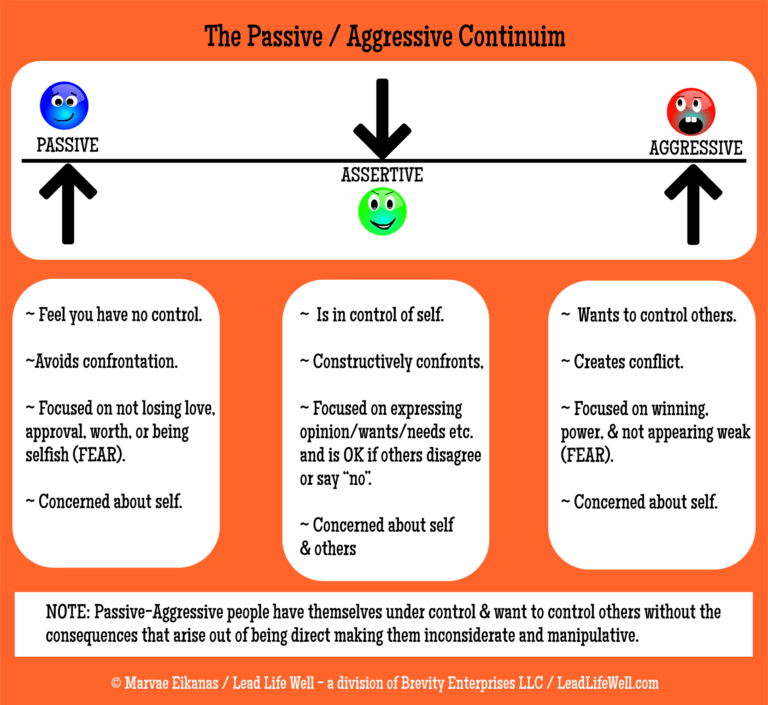How to Be More Assertive

Miss P is my youngest granddaughter and as she edges closer to her first birthday, she has been asserting herself more and more. This little lady has opinions and is not shy about voicing them. In light of the fact that she only speaks a word or two, it is quite amazing that she can so clearly convey her desires. When’s she’s awake, her sweet chubby little finger is firmly pointing out her demands.
The vast majority of Miss P’s desires are off limits for one reason or another right now, but that doesn’t keep her from declaring her wishes again and again.
Having that kind of spunk and persistence is kind of adorable in a wee one who is confident that she will be loved despite her protests and tears.
The years have a way of whittling away at the confidence you once had and before you know it, rather than being assertive, you find yourself becoming more and more passive, or increasingly demanding. Either way, the result is rocky relationships, stress, resentment, worry, and shrinking sense of who you are. It’s tough to succeed with all that in the works!
Fear urges you to engage in some counterproductive behaviors such as people pleasing, being wishy-washy, and the inability to have a voice. Or fear causes you to lean in the other direction where you are overly aggressive and demanding. Fear never allows you to show up at your best!
When you are too passive, people think you are a pushover.
When you are too aggressive, people think you are a jerk.
Being assertive conveys confidence.
Passive is at one end of the continuum and aggressive is at the other. Smack in the middle: Assertive.

There’s no magic pill to becoming more assertive, but the good news is that the more you practice the ABC’s of assertiveness, the more normal being assertive will become. The ABC’s of assertiveness are skills well worth mastering!
A = Awareness
Being assertive starts with awareness and knowing…
- That YOU are valuable – the God of the Universe has uniquely crafted you in His image. That alone makes you valuable. He even went one step further: He treasured you enough to sacrifice His Son to make it possible for you to enjoy a relationship with Him. That’s BIG!
- With certainty what your values, strengths, limits, needs, and wants are. Those are crucial bits; all aspects of self-awareness, that enable you to articulate in a polite and respectful manner your opinions, suggestions, feelings, wants, limits, etc. assertively.
- What’s your responsibility and what’s not so that you can proactively handle your problems without blaming others or expecting them to resolve them for you.
- That others may not always agree with you or like your choices, and being OK with that. You aren’t responsible for how others feel or behave. You are only responsible for yourself and treating others respectfully – like they are valuable too.
- Exactly what your boundaries are.
B = Beliefs
Your beliefs have the potential to silence you, set you off in an angry tirade, or encouraging you to be assertive. You must be able to recognize the beliefs that keep you from being the assertive person you desire to be. If spotting these sorts of beliefs is something you aren’t in the habit of doing you may need the help of a coach or a counselor initially, and it may take time, but the effort invested to develop this ability – well worth it!
Here are a few beliefs that might be hindering your assertive side:
- They (should) know what I need/want – they can read my mind.
- I am too young, inexperienced, unworthy, or _____________.
- If I say “no” they won’t love, appreciate, accept, respect, or ________________ me.
- I am not smart, confident, or good enough.
- My worth depends on what others think.
- I don’t matter.
- In order to be successful I must work like crazy!
- If I am assertive they will think I am too aggressive, pushy, arrogant, controlling, or ______________.
- If I say “no” something awful might happen.
- I don’t have a choice.
- Disagreeing with others is not OK.
Can you see your Fear Monster’s fingerprints? He loves to keep those funky beliefs in place! Put the kybosh on these negative beliefs by telling yourself the truth again and again. It also doesn’t hurt to zero in on who God created you to be – something that reflects God’s character such as Trusting, Loving, Authentic, Courageous, Compassionate, Dependable, Focused, Accountable, beautiful, Creative, Generous, etc. and make that your focus as you practice being assertive. Remember, even your baby steps count!
C = Communication
More often than not, being assertive involves communicating. While anyone can speak words, communicating well – that’s not quite as easy! Here are a few tips to keep in mind as you step out and share more assertively:
- Use “I” statements rather than “you” statements – they are received MUCH better! I want, I feel, I need…
- Remain calm, even if you have to count to 10 or 20 or 100 in your head!
- Keep it short and sweet. More words leads to a greater chance or saying something that might get you in hot water.
- Be direct – don’t wind up, warm up, and beat around the bush.
- Be willing to say “no” without feeling the need to explain in great detail or justify your “no”.
- Reserve apologies for mistakes, moments when you hurt someone, or failing to live up to a commitment. Feeling guilty for speaking up or feeling unsure are not reasons to be apologetic.
- Remember your body is shouting loud and clear! If you want to be assertive, make sure your body language is conveying confidence. Stand tall. Look people in the eye. Shake their hands firmly.
- Be empathetic. It’s easy to assume the motivation of others, but 9 times out of 10 we guess wrong. You never know what the other person is dealing with that might be affecting their interactions with you.
- Don’t be afraid to ask for a moment to gather your thoughts or think something through.
- Use positive language and watch your verbs:
- I will do “x” is better than I could or should do “x”.
- I choose to do “x” is better than I have to do “x”.
- I want to do “x” is better than I need to do “x”
- Sometimes you have to be a broken record and it sounds like this:
“I am unable to take on that assignment with my current work load.”
“I understand that this is important, but I am unable to take on that assignment with my current work load.”
“I would love to help. Unfortunately, I am unable to take on that assignment with my current work load.”
This is not something you would use on a whim, but it can be an effective way to respond when someone persistently ignores your “no”.
- Ask for what you want. A request, not a demand.
- When a situation escalates, be sure that you don’t. Communicate clearly. “This is the third time I’ve addressed this issue of being late with you. The next time you’re late I will take action by…” Depending on the circumstances, this may also be an opportunity to practice using SBI (Situation Behavior & Impact) that is described in this blog post under #8.
Becoming more assertive is possible, and it’s a process. Be patient with yourself. Start small. Keep at it. Anticipate missteps and affirm yourself for trying! Each triumph will leave you feeling that much more empowered and confident! Plus there are some pretty sweet perks to being assertive, like actually getting what you want, better relationships, less stress, and more!
What keeps you from being assertive?
Not achieving the level of assertiveness you’d like? Working with a coach just might be the ticket! Curious about what that’s all about? Contact me here to find out.
© Can Stock Photo / Shalom3
